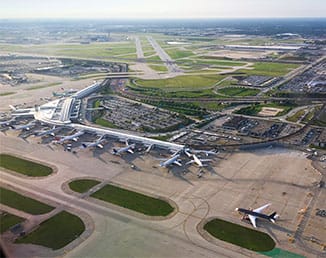As artificial intelligence and automation reshape how we experience travel, industry leaders are gathering to share insights, forge connections, and chart the path forward. Cirium recently hosted its first travel tech networking event, bringing together key voices from across the sector to explore how AI is transforming the traveler experience.
Held strategically after the Business Travel Show at ExCeL London, this inaugural event created the perfect opportunity for meaningful dialogue between industry peers. The evening combined networking with substantive discussion, featuring an expert panel that dove deep into AI’s current applications and future potential in aviation and travel.
Setting the Stage for Innovation
Leanne Mehmet, Sales Manager for Cirium’s Traveller Services Europe, opened the evening by emphasizing the importance of bringing together industry leaders to share knowledge and build relationships. The timing couldn’t have been more relevant, with AI adoption accelerating across every aspect of travel operations.
The event’s format balanced structured learning with organic networking, allowing attendees to engage with both formal presentations and informal conversations. This approach reflected a broader industry trend toward collaborative problem-solving, where companies share insights to advance the entire sector.
The AI Panel: Real-world Applications and Future Vision
The evening’s centerpiece was a panel discussion moderated by Cirium Account Manager Poorva Baderia. The conversation featured three industry experts: Alex Lawrence from Collinson, Micha Van Eijk from Emburse, and Kevin O’Toole from Cirium. Each brought unique perspectives on how AI is currently being implemented and where the technology is heading.
Making Travel Seamless Through Automation
Micha Van Eijk delivered what many considered the evening’s most memorable insight: “Automation is all about taking friction from the travellers.” He expanded on this concept by noting, “When you don’t know things went wrong, that is when automation has succeeded.”
This perspective captures the essence of effective AI implementation in travel. The goal isn’t just to automate processes, but to create such smooth operations that travelers never experience the problems that automation prevents. When flights are rerouted seamlessly, when rebooking happens automatically, and when compensation is processed without traveler intervention, AI has achieved its purpose.
This approach represents a fundamental shift from reactive customer service to proactive problem prevention. Rather than waiting for travelers to report issues, AI systems can identify and resolve problems before they impact the passenger experience.
Data-driven Decision Making Without Human Intervention
Alex Lawrence from Collinson provided concrete examples of how companies are operationalizing AI insights. He explained how Collinson “ingests Cirium’s data in order to push benefits to customers” when disruptions occur, whether through delays or irregular operations.
Lawrence emphasized that effective automation creates “the environment where we make data driven decisions without having to get involved.” This hands-off approach allows companies to respond to disruptions at scale, processing thousands of flight changes and passenger impacts simultaneously.
The key to this success lies in the quality and integration of data sources. When systems can access real-time flight information, passenger preferences, and available alternatives, they can make optimal decisions faster than any human operator could manage.
The Foundation: Unified Data Infrastructure
Kevin O’Toole from Cirium addressed the fundamental challenge that makes AI necessary in aviation: data fragmentation. His observation that “If the data was already joined up together, then we wouldn’t be here” highlights the core problem that AI solutions are designed to solve.
O’Toole used this point to showcase Cirium’s Sky Warehouse, which he described as “automation in aviation absolutely personified.” This platform unifies schedules, flight status, CO₂ emissions data, fleet information, fares, weather, and more into a single, standardized, time-aligned resource.
This unified approach represents the infrastructure layer that enables effective AI applications. Without clean, integrated data, AI systems cannot make reliable decisions or provide consistent user experiences. Sky Warehouse demonstrates how technology companies are solving this foundational challenge.
Current State of AI Adoption
The panel discussion revealed that AI in travel technology has moved well beyond experimental phases. Companies are actively using AI for:
Disruption Management: Automatically rerouting passengers, rebooking flights, and arranging compensation when irregularities occur.
Predictive Analytics: Using historical data and real-time information to anticipate problems before they affect travelers.
Personalized Service Delivery: Tailoring offers, communications, and support based on individual traveler profiles and preferences.
Operational Efficiency: Streamlining internal processes to reduce costs and improve service delivery speed.
These applications demonstrate that AI has become integral to competitive operations rather than a future possibility.
Looking Ahead: The Evolution of Travel Experience
The insights shared point to several key trends shaping the future of travel technology:
Invisible Automation: The most successful AI implementations will be those that travelers never notice because problems are prevented rather than solved after they occur.
Integrated Ecosystems: Companies that can provide unified data and seamless system integration will enable better AI applications across the entire travel experience.
Proactive Service Models: The industry is shifting from reactive customer service to predictive problem prevention, fundamentally changing how companies interact with travelers.
Collaborative Innovation: Partnerships between data providers, technology companies, and service providers are becoming essential for delivering comprehensive AI solutions.
The Path Forward for Travel Technology
The focus on removing friction from the traveler experience, combined with the emphasis on data-driven decision making, shows how companies are balancing technological capability with user needs.
As AI continues to evolve, conversations like this will play an increasingly important role in shaping industry standards and best practices. The insights shared by experts like Van Eijk, Lawrence, and O’Toole provide a roadmap for companies looking to implement AI solutions effectively.
The future of travel technology lies not just in individual company innovations, but in the collaborative efforts of an entire industry working together to create better experiences for travelers worldwide.
For Cirium, this event marked a strategic commitment to fostering meaningful connections across the travel tech landscape. These relationships enable the knowledge sharing and collaboration that drive industry-wide innovation. the traveler experience and optimise travel management.



























































